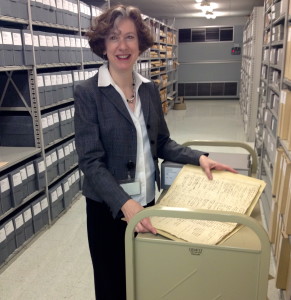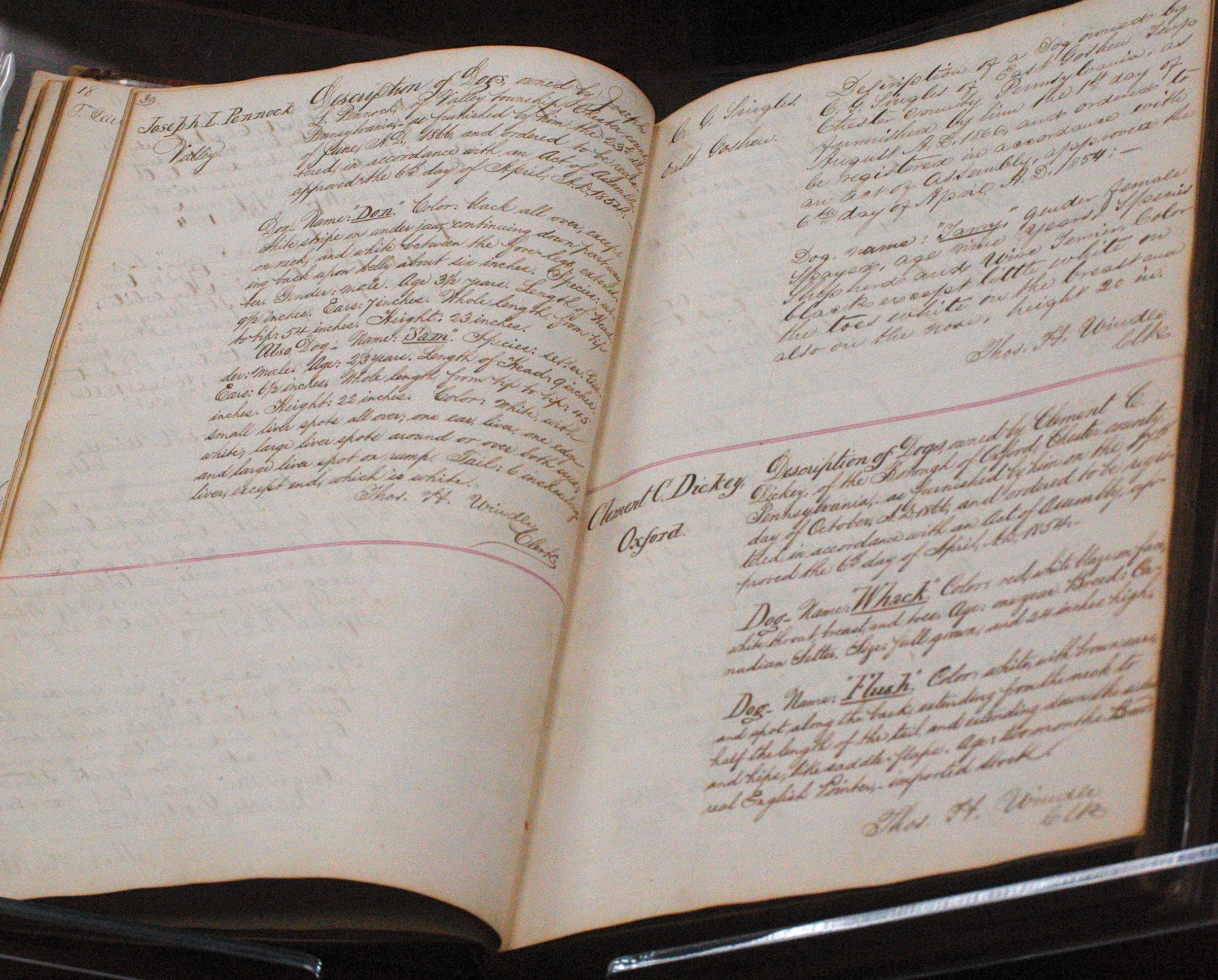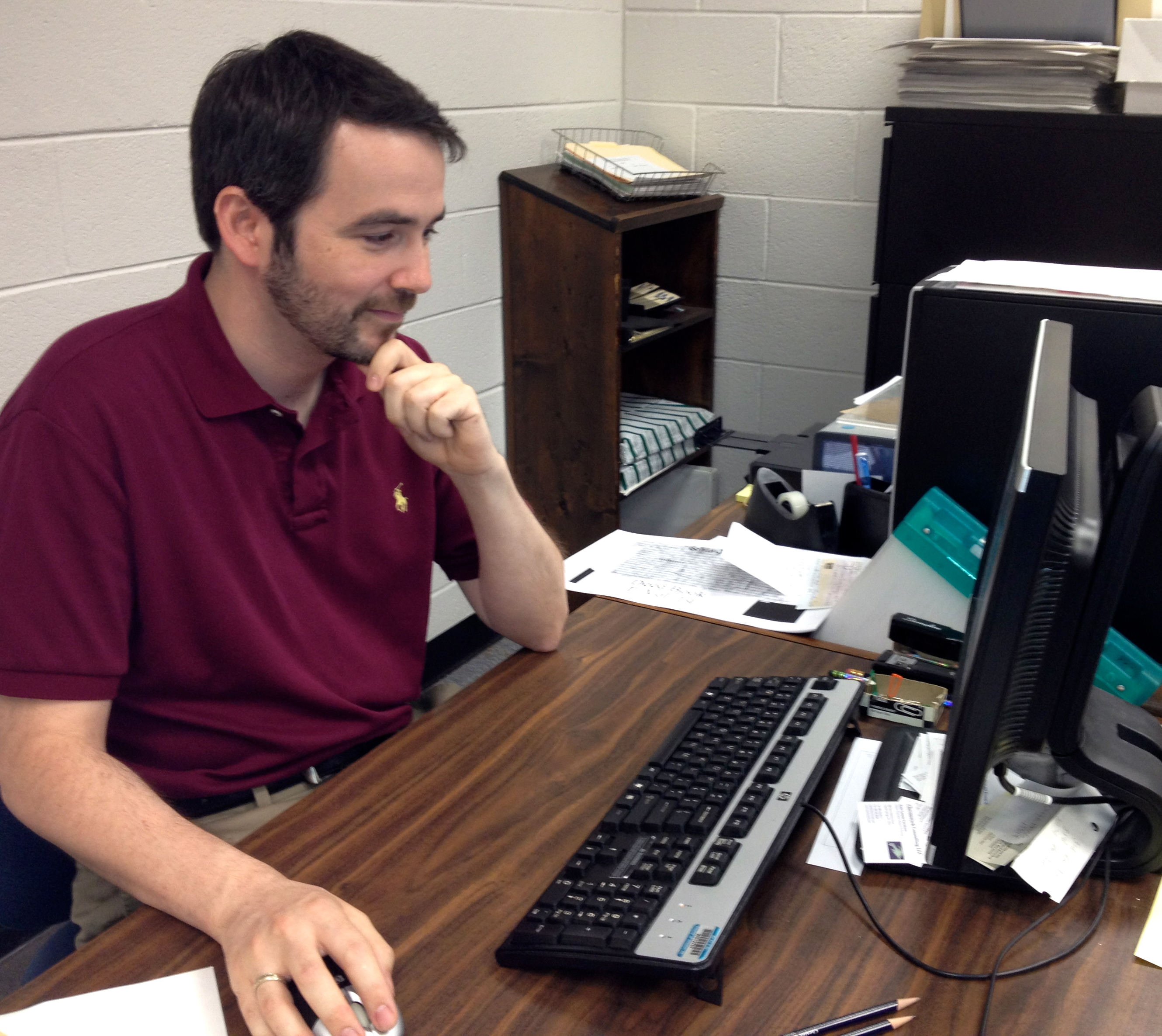Archives celebrating 30-year partnership that has assisted thousands of researchers
By Kathleen Brady Shea, Managing Editor, The Times

Laurie A. Rofini, director of the Chester County Archives and Records Services, checks a document in the climate-controlled storage area.
Confronting the likelihood he would not survive the Civil War, a Chester County native stationed near Hampton, Va., penned a detailed letter to his fiancée intended as a makeshift will – “as binding as the sternest tribunal in the land.”
The fact that William Latta’s fears were founded – although he died from dysentery, not combat – secured his legacy since the letter anchored his estate file. However, the illumination of Latta’s ill-fated background – such as being orphaned young and exiled to a Philadelphia boarding school by his grandparents – owes its existence to an uncommon partnership.
On Aug. 27, Chester County and the Chester County Historical Society will celebrate 30 years of combined efforts to assist thousands of researchers a year: scholars, agencies, municipalities, and residents.
 The Chester County Archives and Records Services, the only such partnership in any county government statewide, has been recognized by the Pennsylvania Historical and Museum Commission as a model for others to follow, county officials said.
The Chester County Archives and Records Services, the only such partnership in any county government statewide, has been recognized by the Pennsylvania Historical and Museum Commission as a model for others to follow, county officials said.
Created in 1982, the Archives was established to preserve and make available the historic records of Chester County, which include such lively litanies as a dog registry. Where else can descendants of Joseph L. Pennock of Valley Township learn about Don and Sam, Pennock’s two prized setters, who are described in painstaking detail, liver spots and all?
Laurie A. Rofini, the Archives director, said the registry existed from 1855 to 1912. “If people registered their dog and it was stolen, someone could be prosecuted for larceny,” she explained.
Besides canine rosters, the Archives houses deed books, estate files, civil and criminal court records, taxes, and marriage license applications – over 2,940 volumes and 1,823 cubic feet of original public records. The oldest? A 1681 court docket.
The treasure trove of county lore has produced revelations such as the location of the first meeting of the commissioners after the Battle of the Brandywine: the “Sign of the Ship” in East Caln Township. East Fallowfield tax records from the late 1700s – prepared by a surveyor named Hugh Jordan – are so specific that they include notations about the physical condition of animals on a property.
The records also spotlight the quest of John W. Odiorne, a late 1800s daguerreotyper, to benefit from his wife’s estate; however, acrimonious letters the two had exchanged – she ran away to become an actress – doomed his cause. An equally grim outcome likely befell Flora Deery: the Directors of the Poor apprenticed her in 1803 at the age of 4 months, 21 days.
“Between our records and the library at the Chester County Historical Society, researchers can really explore a wonderful range of sources,” said Rofini. “Because of the partnership, the reference staffs are familiar with each other’s collections and can make recommendations to researchers about potential sources to check.”
Another benefit, Rofini said, is that the records have been well-protected and centralized, sparing researchers from having to visit multiple venues. In 1993, the office moved from basement space framed by chicken wire in the Mosteller Annex of the historic courthouse.

A dog registry shows that Valley Township resident Joseph L. Pennock owned two male setters in 1854 with ears that were 6 1/2 to 7 inches long.
The collection still resides in the basement, now at the Government Services Center on Westtown Road. However, its present digs provide ample space for researchers as well as environmentally-controlled, acid-free document storage – with no risk of ultraviolet damage.
The Archives has seven full-time employees, three from the Historical Society and four from the county, Rofini said. Most of the citizens who visit are would-be genealogists or house historians, Rofini said. Since the society’s employees are trained archivists, they can assist the public with putting records in perspective, she said. For example, laws in the 1800s required the wife’s name on documents related to the sale, but not the purchase, of a couple’s property.
Because of the high interest in researching historic homes, Cliff Parker, one of the society’s archivists, prepared an online primer, Rofini said. In fact, the office’s own meticulous records – such as logging 622 email and 346 snail-mail inquiries in 2011 – show a decrease in foot traffic for the past several years, which is offset by an increase in online visitors.
“We’re putting more records online and will continue to do that,” said Parker.
He said most of the people committed to researching their ancestry are prepared for wherever the documents lead. One visitor discovered that he was a descendant of the illegitimate child of an indentured servant. “He was thrilled to learn that,” Parker said. “The people who don’t want to know that sort of thing probably won’t look.”
The court records make it clear that people “behaved badly in the 1600s,” much like they do today, Rofini added.
Some of Parker’s research on William Latta’s history will find its way into an upcoming Civil War exhibit at the Chester County Historical Society.
Latta’s fiancée, Julia Smiley, seemed to inherit her betrothed’s misfortune as well as a sliver of his worldly fortune, which included “a large trunk containing among other things some photographs and a large handsome sash.”
Parker said Smiley remained single for 10 years and married a government worker about 10 years her senior in 1871. She died in the 1920s in an insane asylum. “What happened to all of her things?” Parker asked.
One of Latta’s final wishes was to bid his loved ones farewell: “…If my blood is shed in my country’s cause, pray for me that I may meet you in the land where partings are unknown,” he wrote – words that have become part of Chester County history.
For more information on the Archives or to search its online indexes, visit www.chesco.org/archives.







